Post
A catch
Save a catch to start your fishing logbook. You will be able to to share it with the community if yo want!
A fishing trip
Post an ad to go fishing with other fishermen
Save a catch to start your fishing logbook. You will be able to to share it with the community if yo want!
Post an ad to go fishing with other fishermen
Share a thought, a question with the community
My favorite cities
×Join our 483 fishermen and our 2 cofishermen in Upper-Breinton in Herefordshire. The fishing forecast is currently 2.2. The most caught fishes here are the goldfish, barbel fish, the three spined stickleback and the tench fish. Come try the most famous fishing techniques like the fishing for pike with soft lure, heavy trolling for pollack, fishing with traps or fishing techniques for sea bream.
Our fishing forecast of Upper Breinton indicates the best time to go fishing in this city.
The Goldfish
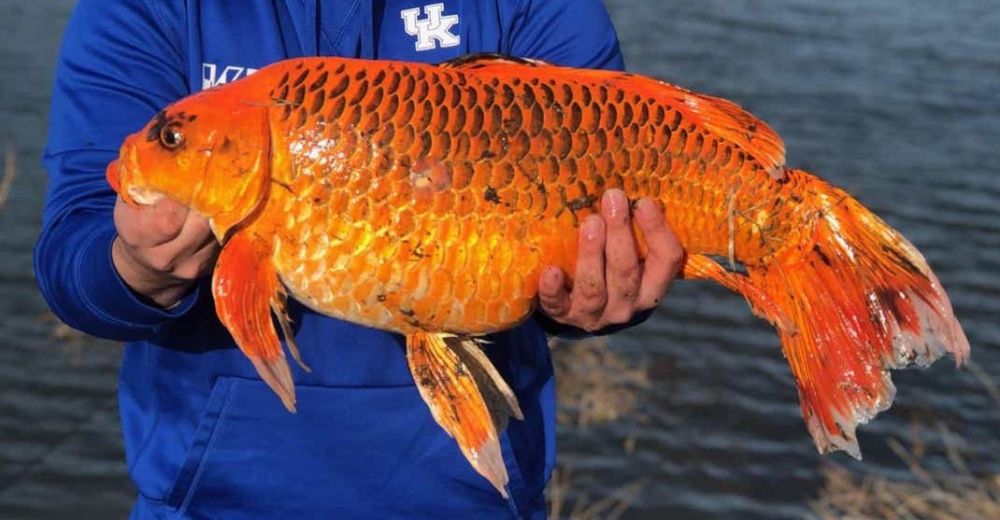
The Goldfish belongs to the Cyprinidae family. This fish can reach 60 cm and live up to 15 years. It breeds in spring for an average of 1000 eggs. In the wild, the species Carassius Auratus or Goldfish has an elongated, laterally compressed and slightly high body. The small triangular head is free of scales and barbells. The dorsal fin, concave or straight, begins at the top of the body and ends at the caudal peduncle. The caudal fin, larger and more indented than that of the Crucian carp, has 17 to 20 soft rays. The ventral and pectoral fins and the anal fin are small and thin. The body is covered with small scales. There are 26 to 31 scales on the lateral line. The colors of the Goldfish vary greatly with the environment in which it evolves, from yellowish to bright golden and bronze. Its back is generally darker and his belly lighter. The main distinctive features of the ornamental shape are its flamboyant red color and its many morphological shapes and aberrations.
The Goldfish is a famous fish you can catch in Upper Breinton.Barbel Fish
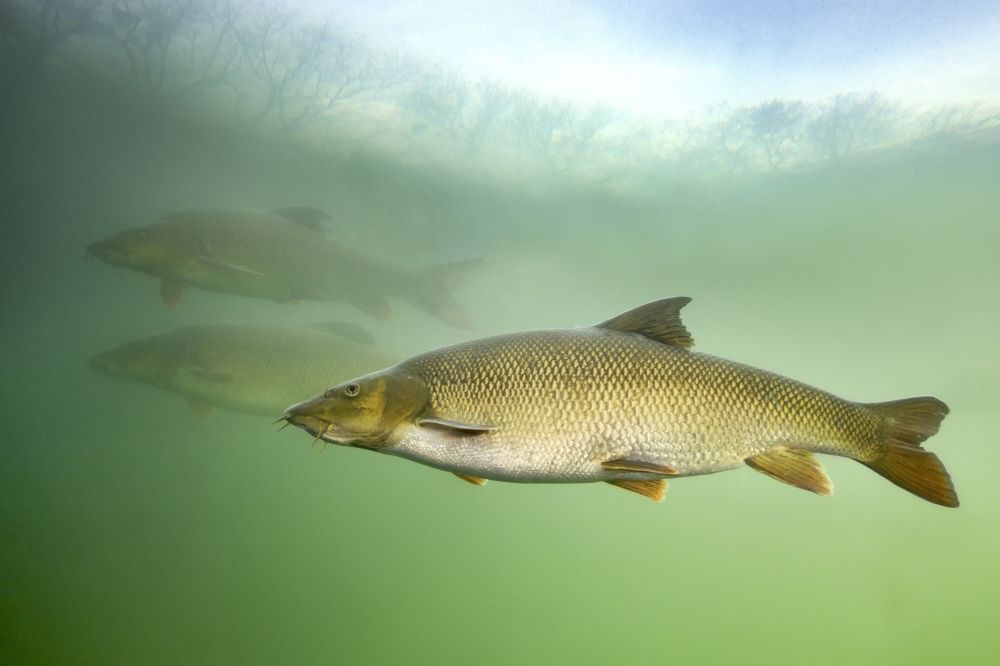
The Barbel fish belongs to the Cyprinids Family. Its maximum weight is 9 kg, and its maximum size is 90 cm but sometimes, it can reach 1 m. It can live 15 years. The Spawning period starts in May and end in July. It can lay up to 9,000 eggs. You can fish Barbel all year. The minimal weight catch is 3 kg. The barbel fish is hard to catch especially in an area where it feels at ease. The Barbel fish, with its streamlined body, shows its perfect adaptation to rivers animated by a more or less rapid stream. Depending on its layout, its color, which may be different, is uniform and slightly lighter on the belly. Barbels are sometimes "grey", sometimes "greenish", and sometimes "golden". Its snout is characteristic and clearly protrudes from its mouth. Note that the dorsal fin has a highly ossified thorny radius.
Barbel Fish is a famous fish you can catch in Upper Breinton.The Three Spined Stickleback
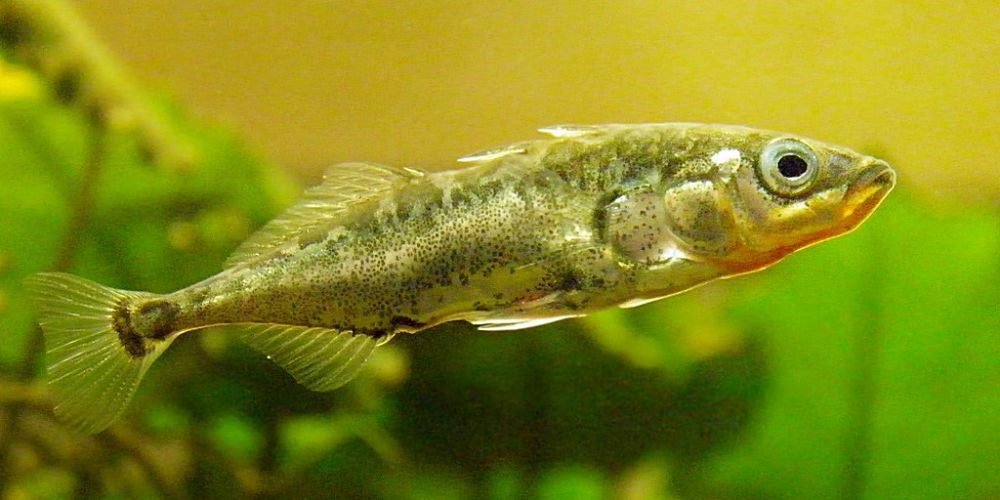
The three spined stickleback belongs to the Gasterosteidae family. The usual size of the three-spined stickleback is 4 to 5 cm for females, with males being a little smaller, about 3 to 4 cm. The life span of the three-spined stickleback varies from 3 to 5 years in natural environments and up to 8 years in captivity. Spawning season extends from March to June. Fertility is 200 to 400 eggs. It is fished from June to March. The three-spined stickleback is a tiny fish with a tapered, laterally compressed body. Its head is quite small, with fairly large eyes, and ends in a narrow mouth that is slightly oriented forward and upwards. The caudal peduncle of the three-spined stickleback is very narrow with a slightly indented caudal fin. The long dorsal fin is set far back, plumbing the anal fin. The dorsal fin of the three-spined stickleback is preceded by three spines, two long and one short, placed on the back of the fish. A curved spine also precedes the implantation of the anal fin. The pelvic fins are replaced by two thorns. The color of this fish is greenish brown for the back, with metallic reflections, silvery for the sides and whitish for the belly. Along the lateral line of the three-spined stickleback, there are no scales but bone plates called "badges", a kind of natural shielding that accompanies the thorny defenses of this fish.
The Three Spined Stickleback is a famous fish you can catch in Upper Breinton.The Tench fish
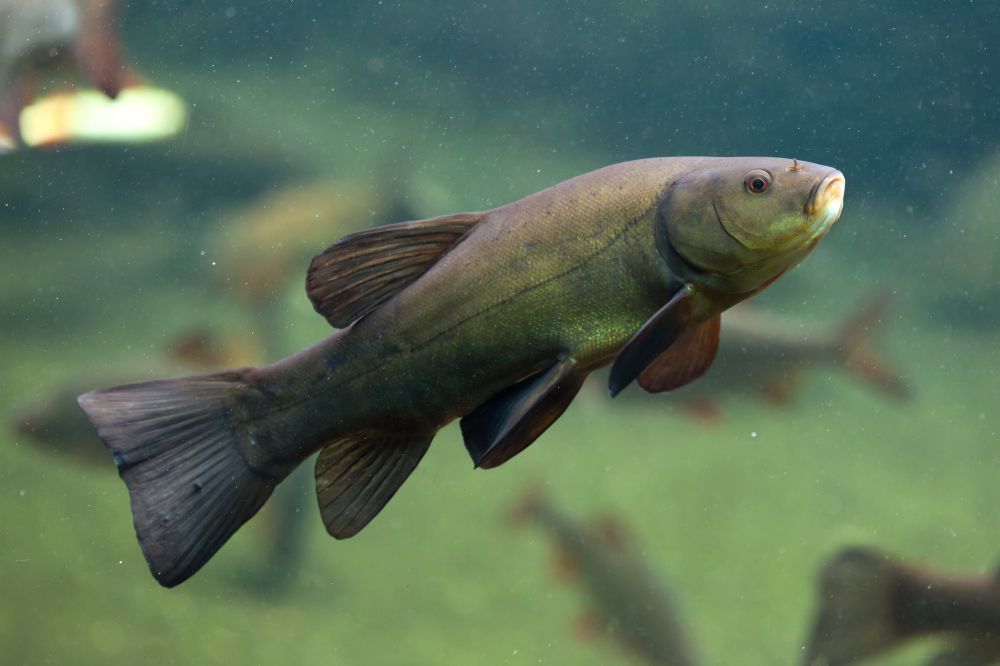
The Tench fish belongs to the Cyprinidae family. It rarely exceeds a length of 50 cm for a weight of 2 kg (maximum 70 cm for 8 kg). He can live up to 15 years. It breeds from May to August. Fertility is 300,000 to 800,000 eggs. It can be fished all year round. The Tench is a fish with a stocky body and compressed laterally. Its head is triangular with a small red-orange eye and a relatively long snout. Its mouth is terminal, small with thick lips and a well-developed barbell at each corner. Its characteristic caudal pedicle is rounded and short. Its skin is thick and viscous. Its scales are very small and covered with a thick layer of mucus. All fins are rounded. The caudal fin has 19 rays. The overall coloring is olive green (sometimes dark green or even almost black) with golden reflections on the ventral side. From the age of two years, males can be distinguished from females: they have ventral fins that reach the anus and the second ray of these fins becomes stronger than the others. It is a groundfish, rather shy, that can be found in small groups of maximum 4 individuals.
The Tench fish is a famous fish you can catch in Upper Breinton.The River Lamprey
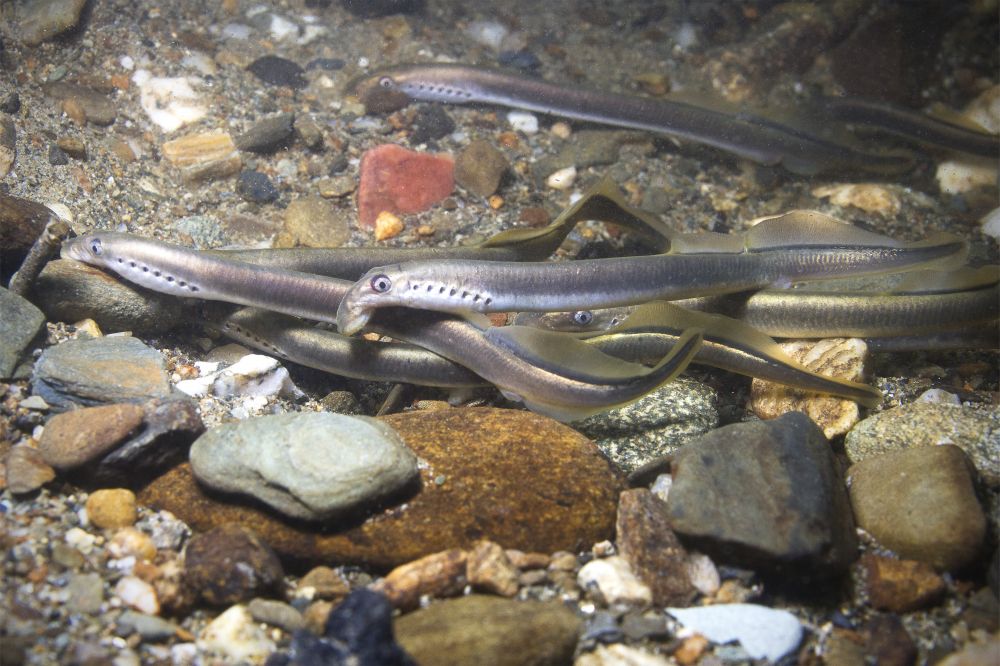
The River Lamprey belongs to the Petromyzontidae family. It measures 18 to 50 cm (average 25 to 35 cm) and weighs 30 to 150 g (average 50 to 70 g). Females are larger than males. The maximum age of the river lamprey is estimated at 10 years. Reproduction takes place between January and May. The number of eggs varies between 4,000 and 40,000. It is caught from January to May. A vertebrate with a cartilaginous skeleton and no jaws, the river lamprey has an anguilliform body, without scales and covered with toxic mucus. Its back is bluish to brownish green. Its sides are greyish, tanned, without mottling. The belly is white. The eyes are very well developed but remain primitive. A single nostril is located between the two eyes. In adults, the circular mouth in the lower position is a suction cup adapted to suction. The buccal disc and tongue are covered with only a few horny denticles, but most of them are strong and acute. On each side of the head, this species has seven pairs of circular gill holes (spiracules). The river lamprey has three fins: one caudal and two dorsal. The two dorsal fins are separated by a small interval, the second being triangular in shape, longer and higher than the first. The larvae are light-colored and its mouth is horseshoe-shaped. His eyes remain hidden under the skin. So it’s blind.
The River Lamprey is a famous fish you can catch in Upper Breinton.Our fishing forecast of Upper Breinton indicates the best time to go fishing in this city.
Our fishing forecast of Upper Breinton indicates the best time to go fishing in this city.
Our fishing forecast of Upper Breinton indicates the best time to go fishing in this city.
